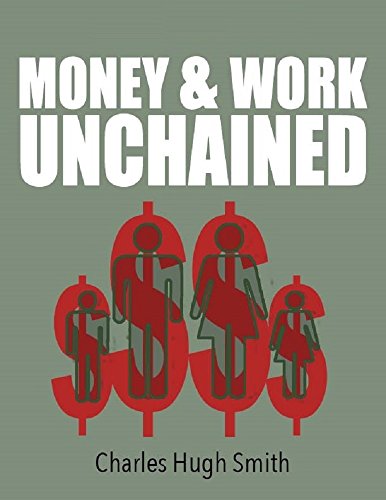I hate to break it to you, but the everything bubble isn’t permanent.
OK, I get it–the Bull Market in stocks is permanent. Bulls will be chortling in 2030 that skeptics have been wrong for 22 years–an entire generation. Bonds will also be higher, thanks to negative interest rates, and housing will still be climbing higher, too. Household net worth will be measured in the gazillions.
Here’s the Fed’s measure of current household net worth: a cool $100 trillion, about 750% of disposable personal income (DPI):
Household net worth has soared $30 trillion in the past decade of permanent monetary and fiscal stimulus. No wonder everyone is saying Universal Basic Income (UBI)– $1,000 a month for every adult, no questions asked–is affordable, along with Medicare For All (never mind that Medicare is far more expensive than the healthcare provided by other advanced nations due to rampant profiteering, fraud and paperwork costs–we can afford it!)
 Check Amazon for Pricing.
Check Amazon for Pricing.
And we get to keep the Endless Wars ™, trillion-dollar white elephant F-35 program, and all the other goodies–we can afford it all because we’re rich!
We’re only rich until the bubbles pop, which they will. All speculative bubbles deflate, even those that are presumed permanent, And when the current everything bubble pops, net worth–and all the taxes generated by bubble-era capital gains–vanish.
Take a look at the Federal Reserve’s Household Balance Sheet (June 2018):
$34.6 trillion in non-financial assets
$81.7 trillion in financial assets
$15.6 trillion in total liabilities ($10 trillion of which is home mortgages)
$100 trillion in net worth
So $25 trillion is in real estate. When the housing bubble pops, $10 trillion will go poof. Maybe $12 trillion, but why quibble about a lousy $2 trillion? We’re rich!
Consumer durables are worth $5.7 trillion, minus consumer debt of $3.8 trillion. As we know from the 2008-09 recession, the value of used boats, BBQ grills and assorted other gew-gaws drops to near zero (boats abandoned to avoid slip fees, etc.), so shave off the phantom $2 trillion in consumer durables.






